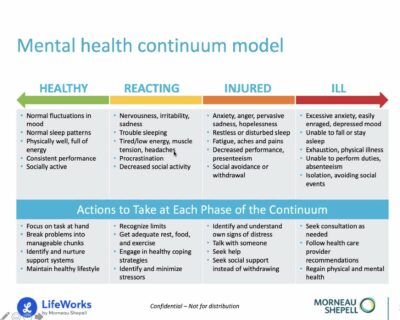Creating a Mentally Healthy Workplace
At a workshop on May 28, teachers, professionals and support staff learned about mental health, stigma associated with mental health and how to support colleagues, friends and loved ones.
The three-hour workshop was hosted by Dawson’s Human Resources Department and led by a facilitator with Morneau Shepell, which runs Dawson’s Employee Assistance Program, a free counselling service available 24 hours a day/7 days a week all year by calling 1 888 687-9197.
Stefano Maiorana, the facilitator, described mental health as “the capacity to feel, think and act in ways that enhance one’s ability to enjoy life and deal with challenges.” He said that when we feel well, we can cope with stress and achieve our goals.
Some signs of mental illness
Recognizing early signs of mental illness in ourselves and others is important. “Your body will never lie. You will feel different, nervousness, pain, exhaustion. This can lead to withdrawal and isolation. You can still function if you are struggling but maybe not like before,” he said.
Getting help as early as possible means beginning to heal faster and lessening the impact.
According to Stefano, it is important to create an environment that is conducive to mental health. “We need to be aware, to talk about it and create an environment where people can come forward if they are struggling,” he said.

Mental illness is very common
The chances are very high that we or someone close to us will experience mental illness. “Depression is the leading cause of ill health and disability worldwide,” he shared. “Fewer than one third of Canadians will seek help. Any given week, 500,000 people in Canada are not able to come to work and if they come, they are not performing as well.”
Stefano emphasized the need for empathy when someone discloses their struggle with mental illness or there are clear signs. He suggested a good response is to say you are sorry to hear that and offer to help and suggested that we parallel our reaction to how we may respond with support if someone is physically ill. If we witness someone struggling, he suggested that we carefully plan our conversation, be specific about what we have noticed, not probe, offer support and respect privacy and confidentiality.
Stefano shared an image of a triangle with three points: work, love, play and said that they all need to be in good shape for our mental health. He also suggested that we do a self-assessment and consider the demands and resources of our lives.
“Building and strengthening resiliency resources protects against mental health problems and disorders,” he said. Of the three points of the triangle, play often does not rate high enough as a priority. Play includes everything we do to enjoy life: sports, socializing, making art, reading, playing music, hobbies, etc.
Stefano’s key messages were:
- Mental illness is common
- People living with mental illness respond well to treatment
- The importance of seeking help early
- Never attempt to diagnose on your own
- Take advantage of the Employee Assistance Program
- It is very important to support mental health
- Being supportive means being an active listener, paying attention and being responsive
There are resources available here: https://www.dawsoncollege.qc.ca/human-resources/wp-content/uploads/sites/42/V2-MS_PG_Mental-Health-in-the-Workplace_EE_Virtual_EN.pdf
There was a previous workshop on April 29 and there are plans to hold more workshops for employees in the future. All managers at Dawson will be receiving this training in the next few weeks.


